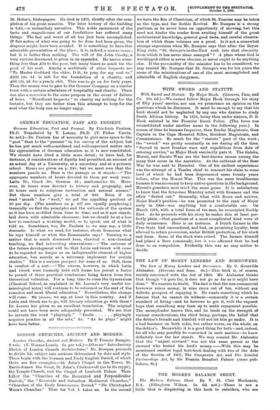WITH SWORD AND STATUTE.
With Sword and Statute. By Major Hook. (Greaves, Pass, and Co. 10s. Gd.)—We cannot follow Major Hook through his story of fifty years' service, nor can we pronounce an opinion on the questions which he discusses. It must be enough to say that his book should not be neglected by any one who desires to study South African history. In 1854, being then under sixteen, D. B. Hook enlisted in the Frontier Rural Police. (The force was reconstituted under another name in the following year.) In course of time he became Inspector, then Border Magistrate, then Captain in the Cape Mounted Rifles, Resident Magistrate, and Commissioner. So much for the " statute" part of the work ; the "sword" was pretty constantly in use during all the time. " Served in most frontier wars and expeditions from date of entering service," as Major Hook succinctly puts it. The Galeka, Morosi, and Basuto Wars are the best-known names among the many that occur in the narrative. At the outbreak of the Boer War he was sent to Herschel. One of his earliest experiences was the attempt of a Tembu chief to reassert his claim to some land of which he had been dispossessed some twenty years before, after the Morosi War. This was the more troublesome because it was necessary to keep native questions in the background. Morosi's grandson next tried the same game. It is satisfactory to know that the Schreiner Ministry acted with firmness and the affair "fizzled out." Generally, what with Boers and natives, Major Hook's position—he was promoted to the rank of Major early in 1900—was anything but a comfortable one. On March 12th, with a total force of ten men, he reoccupied Darkly East. As he proceeds with his story he makes this at least per- fectly plain,—that questions of a most complicated kind were of daily occurrence. Here is an instance. A Dutch farmer in the Free State had surrendered, and had, on promising loyalty, been allowed to retain possession, under British protection, of his stock and farm. Some of the stock were seized. The farmer himself had joined a Boer commando, but it was affirmed that ho had done so on compulsion. Evidently this was no easy matter to decide.
























































 Previous page
Previous page